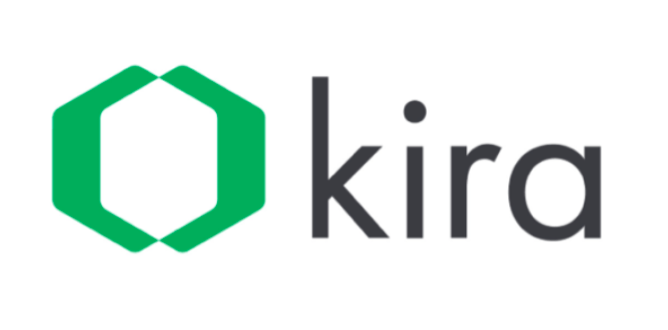
Artificial Lawyer recently caught up with Noah Waisberg (pictured), co-founder and CEO of leading legal AI company, Kira Systems, to find out where the company is now and where it’s heading.
A Growth Story
The Toronto-based company is now around 145 people. Back in early 2014 it was just a handful. So, just in pure headcount terms they are multiple times larger. Moreover, companies don’t hire so many people unless they are needed to meet client demand.
‘We have grown to the point where we now have a team of people just working on talent acquisition,’ notes Waisberg.
This growth is not just a sign of Kira’s take-up, but is also more broadly part of a wider adoption of AI tools across the legal market. Clearly things have come a long way in what is a very short space of time.
In terms of clients, they are now at 120 subscribers and growing continually, with many of the world’s largest firms among that group, plus an increasing number of corporates.
Kira has had particular success in the UK and now has about a dozen people here, primarily operating out of the FUSE innovation space inside global legal services business, Allen & Overy, where it is one of the current cohort. The Magic Circle firm is a client. They also have many of the largest law firms based in the UK as clients.
In short, Kira is now truly embedded into key parts of the global legal market. When Artificial Lawyer first launched back in mid-2016, writing that a legal AI company would have got this far in two and a half years would have seemed to some an unlikely outcome, but here we are, and in reality this is still very early days for the legal AI sector and for Kira Systems.
The Money and The Product
But, what of the huge $50m investment from last year in Kira Systems? How has that changed things?
Waisberg says that it hasn’t really changed things that much. They’re hiring more, across a whole range of skill sets, but beyond that life goes on as usual. Having an additional $50m has not seemed to alter the outlook of Kira’s boss at all it would appear.
‘We were growing quickly already,’ he says – which is true. They were. He adds that 2018 was a great year and they gained plenty of new clients before the external investment arrived. They saw old clients renew and/or expand the use of their technology, and gained additional corporates as new clients.
Adding the investment into the mix just seems to have become part of a broader narrative around growth and client acquisition. One could say it’s simply slotting into a trajectory that was already in full motion, rather than triggering that trajectory.
In terms of the product, there has been a new dashboard, the ‘out of the box’ provisions keep growing, now at around 650. They’ve been working on adding new provisions to cover areas such as LIBOR, aspects of BREXIT, credit agreements and more.
The vast majority of clients are still using the system on the cloud, with a relatively small percentage working with it on premises. They have a new customer service support portal with instructional videos. They’ve even hired a director of training to help customers learn how to get the most out of the technology.
Waisberg also mentions that law firms and corporates are increasingly building out their own provisions using the Quick Study feature. But, perhaps what is of most importance is that customers are making wider use of the system across each business – and that is key to growth.
After all, although there are millions of law firms on the planet. At present it’s the larger commercial firms looking at legal AI review. Hence, a key business driver will be expanding and diversifying use of AI tech across each firm.
‘We started out with M&A, but we now cover things such as data protection, employment and other areas,’ Waisberg adds.
So far, so good. But what next?

The Future
‘We think the opportunity is vast, much bigger than now. For example, many people do not know what their contracts say,’ he points out, referring to how corporates could make much better use of AI review technology to gain legal and business insights into their contract stack.
He also underlines that AI is not just doing work that a human lawyer would do – it’s doing work that simply would not have been done before. Waisberg gives the example of a large company wanting to review its doc stack.
‘Let’s say you have three million contracts and that it would take a lawyer about 60 minutes to do a quick review of each contract. That’s just not feasible,’ he explains.
Artificial Lawyer takes the point: that’s 3 million hours of legal work. Even at an ‘economical’ paralegal rate, let’s say of $50 per hour, that’s going to cost $150 million – and that would be for the most surface level of reviews. And that’s without considering that all the extracted insights from the review need to be uniformly catalogued and put into a useful format that the in-house legal team can actually use. It would also take even the largest law firm months and months to do such a job. I.e. it’s an impossible task for human lawyers alone.

Clearly then, Waisberg sees working with corporates as an area of significant potential future growth.
But, what of the technology? Are we going to see a big leap forward in ML and NLP tech in the legal space? Will there be some kind of quantum leap in how legal AI companies perform their work?
Waisberg says that they are putting a lot of effort into hard scientific research, even publishing academic papers on AI. But, for now – at least as far as he is willing to disclose – we are not about to launch into a whole new world of NLP and ML. But, he notes, deep learning around text is one such area that is showing promise.
And quantum computing…? Is that going to be a game changer? Waisberg replies that the challenge there is actually having a working quantum computer to play around with. So the answer seems to be: not at present.
One final aspect of change that Waisberg highlights is making better use of its own data. Perhaps ironically for a business based on the analysis of data, Kira has not always had time to consider their own dashboard. Better use and analysis of their own business data will help them to understand customer use and needs, as well as to direct investment to exactly where it’s needed.
Conclusion
The overall message seems to be: steady growth, embedding their AI technology deeper and deeper into the market. The money will help, but it’s not marking a change in strategy. Keep improving the technology, keep improving client support and widen the offering.
You could say that this is a philosophy of incremental, but continual, improvement – building Kira Systems outward step by step. Fundamentally, the global uptake of legal AI technology is going to be a marathon, not a sprint, and Waisberg is very well-suited to leading an AI company in this kind of world.
For example, he explains that part of this growth will come organically, such as when a client using Kira inspires the law firm on the other side of a deal to also make use of it, something which happens, Waisberg notes.
That makes sense, as the other firm is likely to want to know what kind of due diligence process you may be running. When they hear what’s going on at a peer firm on the other side of an M&A deal it understandably makes them consider why they aren’t doing it like that. Maybe they’ll seek to use Kira, or maybe another system, but either way they’re going to start thinking more deeply about how they produce their work and how AI technology can play a part in it.
On one level it feels like Kira has a momentum now of its own, that just by market osmosis it will spread in terms of use. But, they are not resting on their laurels, there is a huge market opportunity out there and Waisberg is only getting started.
1 Trackback / Pingback
Comments are closed.